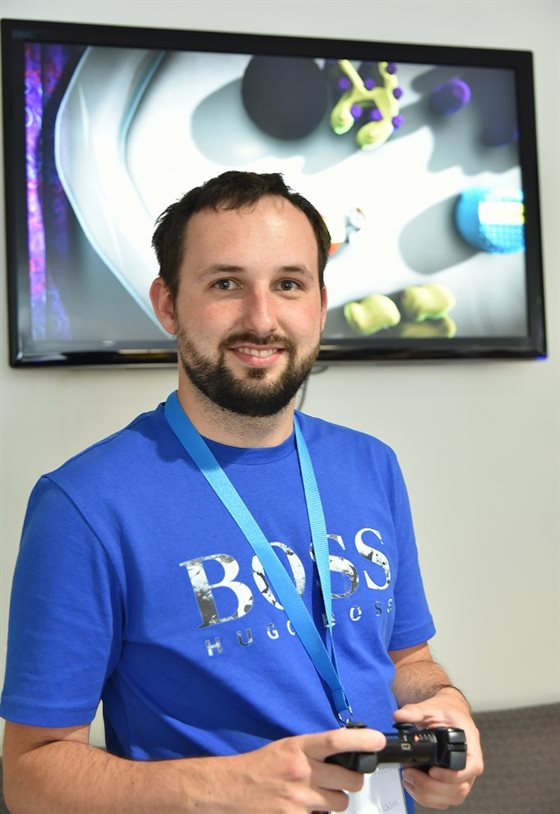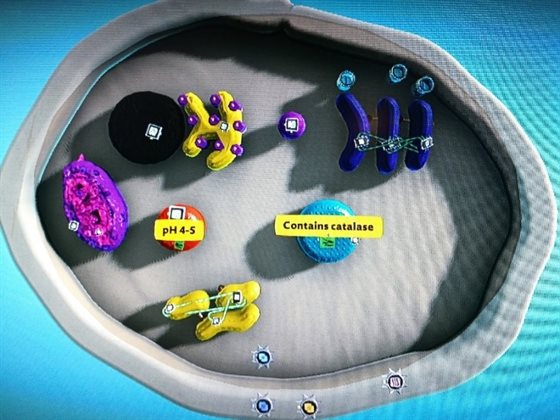A Biomedical Science graduate who turned his course material into a PlayStation game will present his innovation at the international Playful Learning Conference in Leicester today.
De Montfort University Leicester (DMU) alumnus Sam Charlesworth created the game ‘univerCELL’ for his final year dissertation project, to see if playing educational video games can be beneficial to students’ learning.

He came up with the idea after converting his own degree revision notes into an interactive game on his PlayStation using LittleBigPlanet – a piece of software that enables players to generate their own content using in-game creation tools.
“I wasn’t the most active kind of student when it came to revision, but when I started using my PlayStation to make complicated scientific ideas into games and cartoon diagrams for revision, it really started to stick,” explained Sam, from Barrow-on-Soar.
“I made quite a few different games and quizzes for my own revision purposes during my degree. They were always so much more fun, engaging and memorable than just reading a textbook.
“One day, I showed a couple of my games to my friends and lecturers and got some really positive feedback, which inspired me to create a final year research project about my games.”
Sam’s research showed that those who used his game as a revision tool performed significantly better in a test than those who didn’t. 88% of students who took part in his study also said they enjoyed revising using the PlayStation more than conventional paper-based revision.
“I was very pleased that students from all walks of life enjoyed the game and got something from it,” he said.
Designed to help students revise the different parts of living cells, univerCELL has been specifically created for undergraduate students studying Cell Biology.
Thought to be the first PlayStation game of its kind, players can control a customisable scientist character who must select the correct building blocks of a cell when prompted.

“I have mild autism and I like to express my personality in my games,” explained Sam. “That’s why I thought it was important to be able to customise the main character – so that students from all backgrounds would feel more engaged with the game.”
Sam’s research also showed that the game was suitable for students from all walks of life – regardless of their gender, age, ethnicity or nationality – and that it didn’t matter if they had previous gaming experience.
Dr Jo Rushworth, Sam’s project supervisor at DMU, said: “Sam’s game-based learning tool is a fantastic example of DMU’s innovative Universal Design for Learning (UDL) framework, which is all about flexible teaching and learning methods that allow all students to succeed.”
RELATED NEWS
DMU academic to help train next generation of game intelligence researchers
DMU grad leads the way in the gaming industry
Crowdfunders needed to set innovative VR game free to fly
UDL aims to provide an equal learning experience for every DMU student by delivering personalised teaching and support.
The principles of UDL are the product of decades of research about how people learn, and are based on more than 800 different research studies. At the heart of the UDL approach is the idea of embedding inclusivity and choice for both lecturers and students.
Sam will showcase his work at the Playful Learning Conference, an event that demonstrates the relationship between learning and play for adults. Underpinned by robust research and working practices, the conference welcomes teachers, researchers and students to discover new and innovative ways of learning.
“I feel very privileged to have been given a place to share my game at the Playful Learning Conference, particularly as I have always loved gaming,” added Sam. “It will be a great opportunity to get feedback, meet like-minded researchers and learn from their projects.”
The game univerCELL is due to be released to the public on LittleBigPlanet next month and Sam is also hoping to get his research published later this year.
Posted on Wednesday 10 July 2019